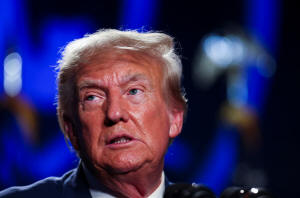Trump argues proposed limits on 2020 election case evidence violate free
speech
 Send a link to a friend
Send a link to a friend
 [August 08, 2023]
By Jacqueline Thomsen [August 08, 2023]
By Jacqueline Thomsen
WASHINGTON (Reuters) -Donald Trump's lawyers urged a federal judge on
Monday to reject a protective order sought by prosecutors ahead of the
former U.S. president's 2020 election trial, saying it would violate his
free speech rights under the Constitution.
Prosecutors, in asking for the protective order, argued that Trump could
otherwise improperly disclose confidential evidence before trial.
In a filing late on Monday, U.S. District Judge Tanya Chutkan ordered
the two sides to meet on Tuesday and agree on two possible dates for a
hearing to be held no later than Friday on the matter.
Trump's attorneys, in a 29-page filing to U.S. District Court in
Washington on Monday, did not directly address the assertion of
potential witness intimidation.
They did acknowledge that some court documents should be shielded from
the public, such as materials from the grand jury investigation that led
to last week's indictment accusing Trump of orchestrating a plot to
overturn his 2020 election loss.
"However, the need to protect that information does not require a
blanket gag order over all documents produced by the government,"
Trump's attorneys wrote in the court papers.

"In a trial about First Amendment rights, the government seeks to
restrict First Amendment rights," Trump's attorneys said, referring to
the right of free speech guaranteed by the U.S. Constitution.
In a reply brief, prosecutors said that since they had asked for the
protective order, Trump's attorneys had discussed the case on major U.S.
television networks. Prosecutors said Trump had a "plan to litigate this
case in the media."
Trump on Thursday pleaded not guilty to federal charges that he
conspired to try to overturn his 2020 election loss to Democratic
President Joe Biden. It was the third criminal case brought against
Trump so far this year.
At his arraignment on Thursday, Trump swore to not intimidate witnesses
or communicate with them about the case without legal counsel present.
Prosecutors on Friday, in their request for a protective order from
Chutkan, pointed to a post from Trump on his Truth Social site that
said, "IF YOU GO AFTER ME, I'M COMING AFTER YOU!"
[to top of second column]
|

Former U.S. President and Republican
candidate Donald Trump makes a keynote speech at a Republican
fundraising dinner in Columbia, South Carolina, U.S. August 5, 2023.
REUTERS/Sam Wolfe/File photo

Prosecutors said the post could suggest that Trump, the front-runner
for the 2024 Republican presidential nomination, might try to
intimidate witnesses.
Under a process known as discovery, prosecutors must provide
defendants with the evidence against them so they can prepare a
defense. Prosecutors in their Friday filing said they are prepared
to provide Trump with a "substantial amount" of evidence once a
protective order is issued.
A Trump spokesperson on Saturday denied that the Friday post was
related to the trial, saying instead that Trump was attacking people
dubbed "Republicans in Name Only," or RINOs.
But Trump's social media posts have escalated since prosecutors'
Friday court filing. He has said he will seek to have Chutkan, who
was appointed to the bench by Democratic President Barack Obama,
recused from the case. Trump's lawyers have not yet officially made
that request.
Chutkan previously ruled against Trump in a civil lawsuit seeking to
block White House records from a congressional investigation into
the Jan. 6, 2021, attack on the U.S. Capitol by Trump supporters.
She also has strongly spoken out against the Capitol attack in
criminal cases stemming from the riots. Prior court rulings are not
enough to require a federal judge to step aside from a case.
Trump lawyer John Lauro has said he will seek to transfer the 2020
election case from Washington, D.C., to West Virginia. While
criminal cases are sometimes tried in different locations than where
they are brought in order to sit an impartial jury, others charged
in the Capitol siege have failed in trying to have their criminal
cases transferred out of the Washington federal trial court.

(Reporting by Jacqueline Thomsen; additional reporting by Dan
Whitcomb; Editing by Scott Malone, Howard Goller and Leslie Adler)
[© 2023 Thomson Reuters. All rights
reserved.]This material may not be published,
broadcast, rewritten or redistributed.
Thompson Reuters is solely responsible for this content. |